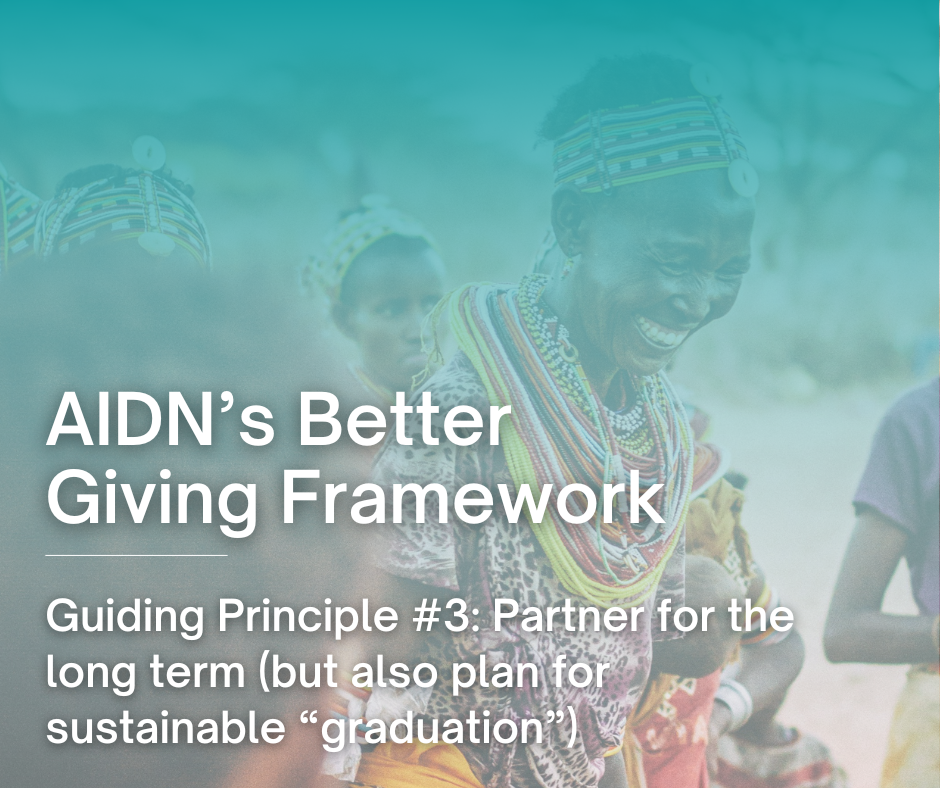AIDN’s Better Giving Framework is a key resource for funders that shares what we believe, and what our network has helped us to understand, are the key principles that underpin “better” giving and investing in today’s international development sector. The third Guiding Principle of our Better Giving Framework is: “Partner for the long term (but also plan for sustainable “graduation”). Read below to learn more about and access detailed resources on Guiding Principle #3.
At AIDN, committing to longer-term partnerships is another key Guiding Principle that underpins our Better Giving Framework. Whilst still acknowledging the importance of short-term grants, such as for capacity building grants that seek to address immediate technical expertise or needs, committing to long term partnerships means moving away from project-based or transactional funding to longer-term and trusted relationships. Longer-term and trust-based partnerships can also mean contributing more than just a fiscal grant and instead involves introducing grantees to wider professional networks, providing capacity building, organisational support or access to technical expertise.
The benefits of committing to longer-term relationships are also two-way. For example, many funders in AIDN’s network have explained that by committing to longer-term relationships they have been able to watch leaders grow and scale their organisations. For some funders, they have even had the opportunity to observe the moment when an organisation “graduates” or scales beyond the funders’ typical grant making portfolio – such as scaling up to government adoption.
That said, it is also important to realise that the goal is not to create a long term dependency on external or foreign funding. As part of the localisation ethos, funders should also consider how to support the organisations they work with to grow and flourish beyond the financial support of an external or foreign funder. The fable of NGOs or programs ceasing operations when external funding ends has been documented too many times.
Instead, AIDN encourages funders to think about the scale of their impact, how long they intend to partner for and what happens after their funding will stop from the get-go. As the StopAIDs “successful transition” campaign explains: “ensuring sustainable transitions [after external funding has ended] is the shared responsibility of multiple stakeholders including, governments, funders, technical partners and civil society”. A further example includes BRAC’s Ultra-Poor Graduation Initiative that supports individuals living in extreme poverty by providing a combination of assets, training, and mentorship to “graduate” to self-sufficiency.
For more resources on long-term partnerships and graduation:
- “AIDN’s Better Giving Framework Webinar #3: Partner for the long-term (but also plan for sustainable “graduation”) featuring Andy Bryant, Audette Exel AO, Weh Yeoh and Gayle Deighton.
- “Towards new partnerships – how to improve collaboration with innovators from the Global South” by Benjamin Kumpf and Parnika Jhunjhunwala for International Development Innovation Alliance
- “Maximizing the impact of partnerships for the SDGs: A practical guide to partnership value creation” by UNDESA and The Partnering Initiative 2019
- “The only good development program is one you can leave behind”by Tamar Kosky Lazarus (IsraAID) for The AIDN Beat 2024
- “Building long-term partnerships with nonprofits to scale impact: lessons from sustained funding relationships” by Susan Olivio and Brad Turner for Philanthropy News Digest 2021
- Philanthropod 2023: “Yevu Clothing: realising the transformative impact of economically empowered women” – AIDN’s Philanthropod with Anna Robertson – founder of Yevu Clothing;
- “Principles of a successful transition from external funding” from StopAIDS 2018
- “Partner graduation – Food for Education” by Partners For Equity 2024
- “Unearthing and investing in African change-makers” – AIDN’s Philanthropod 2024 with Andy Bryant, Executive Director at Segal Family Foundation
- “Understanding sustainable outcomes in international development: towards a realist evaluation framework” by Simon Feeny, Gill Westhrop and Emma Williams for Journal of International Development 2022
